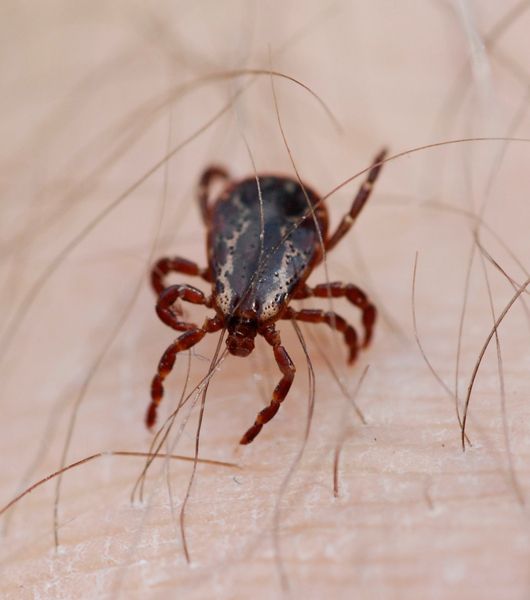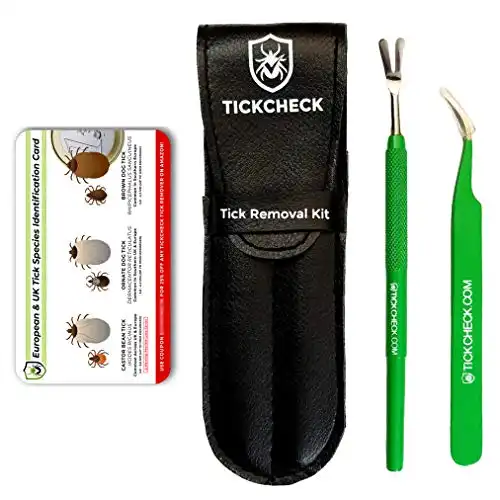Admittedly, I’m a bit of a last-second packer, and when going out to the streams or getting into a day in the woods, I like to keep my bag as light as possible.
Hydrogen peroxide is one of those things I always try to pack just in case, as it works wonders for cleaning little cuts and scrapes you accumulate on a hike.
Ticks are a hiker’s worst enemy. These little parasites hide in tall grass and brush, and when they come out in the warmer months, I start thinking if anything in my bag could take care of them conveniently.
Does hydrogen peroxide kill ticks and can you use it to get ticks out if they have already attached to? What about using hydrogen peroxide for killing ticks in your home?
Hydrogen peroxide may be effective in killing or irritating ticks, but it isn’t considered the most reliable method for dealing with them. While dropping a tick in a cup of hydrogen peroxide may kill it, solutions like rubbing alcohol and bleach are much more effective for dealing with ticks.
You should NOT use hydrogen peroxide to try to get an attached tick to back out. Irritating the tick whilst it's attached can cause it to regurgitate into you (yuck!) which can lead to an increased chance of disease transfer. You should remove ticks with a fine tipped tweezer or tick removal device.
You can then treat the wound with hydrogen peroxide to help sterilize it. However, if you get sick after a tick bite you should see a doctor as ticks can transfer a variety of diseases, including Lyme disease.
Hydrogen peroxide is definitely capable of killing a tick due to it’s ability to break down cells, but I wouldn’t really recommend it for tick extermination or removal.
When you think of all the factors at play, things like the concentration of your solution, how long you can expose them to it, and the size of the tick, it just really isn’t the best method, and we’ll go into further detail about these reasons below.
Can Hydrogen Peroxide Kill a Tick?
At some point in your life you’ve probably poured hydrogen peroxide into a cut or scrape and seen the little bubbles appear (I didn’t like this as a kid).
What you’re seeing is the reaction that the solution has to any bacteria and nasties in the wound, and hydrogen peroxide is capable of destroying cell walls and killing bacteria.
Hydrogen peroxide can have the same effect on a tick (see this video but be warned, it’s nasty). When hydrogen peroxide was injected into the tick it caused the tick to explode and it's inside come out (I did warn you it was nasty).
It can certainly be enough to drown one of the pesky little guys, but I would not make hydrogen peroxide your go-to for this purpose.
Your standard hydrogen peroxide that you keep in the cabinet is likely a weaker concentration, and when compared to solutions like rubbing alcohol or bleach, it won’t work nearly as instant to take out a tick.
Personally I’d leave the tick killing to more powerful solutions like alcohol and follow up with hydrogen peroxide to clean a bite, and sources like the CDC and this guy’s “tick-tomb” agree.
Will Hydrogen Peroxide Cause a Tick To Back Out?

When it comes to removing a tick, you shouldn’t really ever wait for one to back out on it’s own.
You may have seen or heard about home remedies where solutions can make a tick release it’s grip, and while hydrogen peroxide may irritate a tick, waiting for it to release is both dangerous and an inefficient way to get rid of one.
For one, ticks are stubborn little devils and there really isn’t much evidence that hydrogen peroxide will cause it to give up it’s food.
Also, using methods like this to force a tick to let go can result in the tick regurgitating into the bite (gross), which can lead to more pathogens and bacteria entering your bloodstream (higher chance of Lyme).
For these reasons, I would never recommend using hydrogen peroxide to make a tick back out, and you should instead use the guaranteed method to remove a tick and finish it with a solution like alcohol.
Fine tipped tweezers or a tick removal device are your best options. The sooner you remove the tick the better, which is why I always try to take one of the above linked kits with me on my hikes (especially when hiking with dogs)
You can then use hydrogen peroxide to clean the wound after the tick has been removed.
Kit includes stainless steel tick remover for safely removing larger embedded ticks and a specially shaped super-fine-tip tweezer for removing nymphs and small deer ticks. All kept in a leather pouch with a handy tick identification card.
Can Hydrogen Peroxide Be Used To Kill Ticks on Humans or Pets?
Hydrogen peroxide, while capable of irritating a tick, will likely not be strong enough to work efficiently as a topical solution for repelling or killing these pests.
Removing a tick should always be done with a pair of tweezers, whether it’s a human or pet, and by following the method in the video below you can remove one safely.
Once you have the tick removed, killing it can be done with a solution like alcohol or bleach.
While dropping a tick in hydrogen peroxide can kill it, you’ll find it much more effective and instant to use one of these stronger solutions, and for preventatives I would recommended using specialized tick repellents for clothing or pets.




